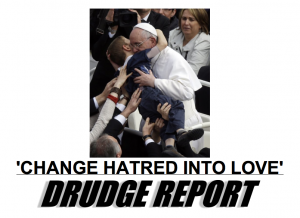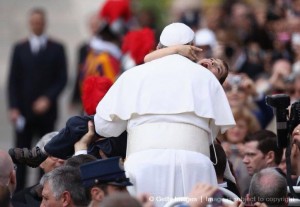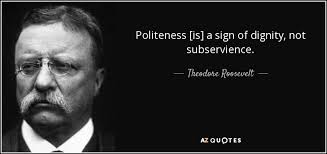“Small acts with great love,” Mother Teresa was fond of saying. Yesterday, Pope Francis bestowed an extraordinary Easter blessing upon my family when he performed such an act in embracing my son, Dominic, who has cerebral palsy. The embrace occurred when the Pope spied my son while touring the Square, packed with a quarter million pilgrims, in the “pope mobile” after Mass. This tender moment, an encounter of a modern Francis with a modern Dominic (as most know, tradition holds that St. Francis and St. Dominic enjoyed an historic encounter), moved not only my family (we were all moved to tears), not only those in the immediate vicinity (many of whom were also brought to tears by it), not only by thousands who were watching on the big screens in the Square, but by the entire world. Images of this embrace quickly went viral, and by Easter Sunday afternoon it was the lead picture on the Drudge Report, with the caption, “Change Hatred into Love” (a paraphrase of Pope Francis’ Urbi et Orbi message that followed shortly thereafter),  where it remains even as I write this. Fox News, NBC Nightly News, ABC Nightly News, and CNN all showed clips of it. Lead pictures of it were found in Le Figaro, the New York Post, The Wall Street Journal, the Philadelphia Inquirer, inter alia.
where it remains even as I write this. Fox News, NBC Nightly News, ABC Nightly News, and CNN all showed clips of it. Lead pictures of it were found in Le Figaro, the New York Post, The Wall Street Journal, the Philadelphia Inquirer, inter alia.
It is often difficult to try to express to people who do not have special needs children what kind of untold sacrifices are demanded of us each and every day. And as for Dominic, he has already shared in Christ’s Cross more than I have throughout my entire life multiplied a thousand times over. What is the purpose in all this, I ask? Furthermore, I often tend to see my relationship with Dominic in a one-sided manner. Yes, he suffers more than me, but it’s constantly ME who must help HIM. Which is how our culture often looks upon the disabled: as weak, needy individuals who depend so much upon others, and who contribute little, if anything, to those around them.
Pope Francis’ embrace of my son yesterday turns this logic completely on its head and, in its own small yet powerful way, shows once again how the wisdom of the Cross confounds human wisdom. Why is the whole world so moved by images of this embrace? A woman in the Square, moved to tears by the embrace, perhaps answered it best when she to my wife afterward, “You know, your son is here to show people how to love.” To show people how to love. This remark hit my wife as a gentle heaven-sent confirmation of what she has long suspected: that Dominic’s special vocation in the world is to move people to love, to show people how to love. We human beings are made to love, and we depend upon examples to show us how to do this.
But how can a disabled person show us how to love in a way that only a disabled person can? Because the Cross of Christ is sweet and is of a higher order. Christ’s resurrection from the Cross proclaims that the love he offers us, the love that we, in our turn, are to show others, is the REAL reason he endured the Cross in the first place. Our stony hearts are transformed into this Christ-like love, and thereby empowered to change hatred into love, only through the Cross. And no one shares in the Cross more intimately than the disabled. And so the disabled become our models and our inspiration. Yes, I give much to my son, Dominic. But he gives me more, WAY more. I help him stand and walk, but he shows me how to love. I feed him, but he shows me how to love. I bring him to physical therapy, but he shows me how to love. I stretch his muscles and joke around with him, but he shows me how to love. I lift him in and out of his chair, I wheel him all over the place, but he shows me how to love. I give up my time, so much time, for him, but he shows me how to love.
This lesson, to repeat, confounds the wisdom of the world. Heck, it confounds me when I, as his parent, so often fail to see my son’s condition for what it is. The lesson my disabled son gives stands as a powerful testament to the dignity and infinite value of every human person, especially of those the world deems the weakest and most “useless.” Through their sharing in the “folly” of the Cross, the disabled are, in truth, the most powerful and the most productive among us.
One more thing. Pope Francis’ embrace of my son, Dominic, indicates that we should not interpret the new Pontiff’s expressed devotion to the poor, already a cornerstone of his pontificate, in facile, purely material (let alone political) categories. His Easter embrace of my son stands out as a compelling witness to the kind of “poverty” that he urges us to adopt, the poverty that he pointed to in the opening line of his Urbi et Orbi message yesterday: “I would like [the message of Christ’s resurrection] to go out to every house and every family, especially where the suffering is greatest…” Parents of disabled children, stand up and find solace and encouragement in these simple yet profound words.




Many thanks for posting this. As a father of six children, five of whom are on the autism spectrum, I deeply appreciated Gondreau’s reflection. It sounded so similar to the way I try to think through the challenges of raising children with disabilities.
Beautiful. By the way, the embrace is at about 10:30 in the YouTube clip for all those who want to skip ahead.
As if the pope’s embrace was not a blessing enough for us all (I saw it live before I even knew who the boy was), this essay adds to the grace of this event. I am going to have my mom read this. She was always athletic and active but now, at 85, is slowing down quickly with Parkinson’s. I am her primary caretaker and she sometimes says that she is a burden. Nothing I’ve said in response even comes close to your words, Dr. Gondreau. Many, many thanks to you, your family, and most especially to Dominic.
This is very beautiful. To echo another Mother Teresa sentiment, the “poor” may be in our very own family. We do not have to travel far to find those who are outcast, marginalized, forgotten, neglected or lonely.
What I love about this image most is all the people holding little Dominic up. It is not just the pope who has your little boy in an embrace; it is the crowd too. Those standing around Dominic forgot themselves for a minute and their (probably) burning desire to touch our Holy Father and instead held up a little boy so HE could touch the Holy Father.
Thank you so much for this post – brilliant and beautiful.
Thank you for this post. As the blessed mother of a 15 year old daughter with CP and other developmental issues, I always knew God had a special plan for her in this world. You have put into words what I have always felt. I find myself praising God that I have this child who shows me Jesus every day and He chose me to be her mum. Blessings